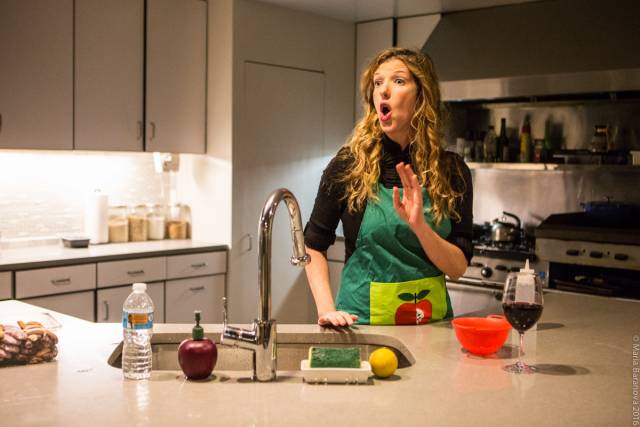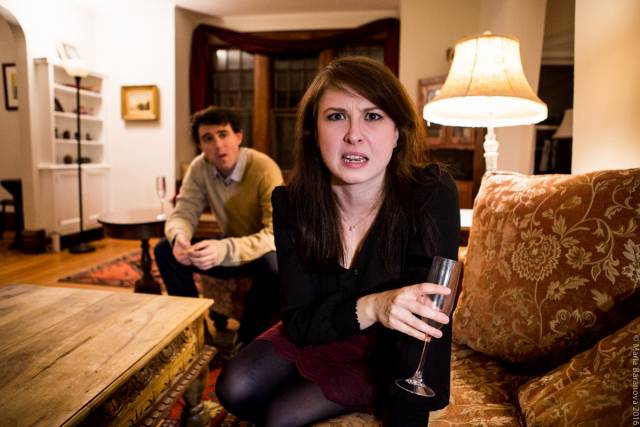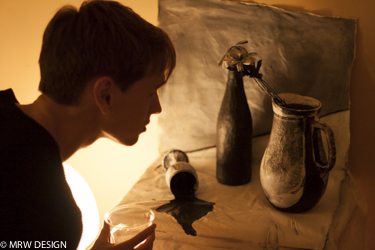

From the Staten Island Ferry, to Picasso’s dining room, the work of Erin Mee defies the notions many people have of where theatre should take place. But the proscenium isn’t the only thing she removes from her work, she also does without the timidity that often prevents playwrights and directors from dealing with social class in an open way. Whether by the admission price, the setting, or the ideas behind each work, Mee’s work at its center is always a discussion of inequality and how we deal, or choose not to deal with. After a successful run in the fall of 2015, her immersive piece Versailles, is back for a limited run. In Versailles, a select few are invited to the home of a New York socialite who will premiere a piece she commissioned for her bathtub. What follows this Buñuel-esque premise is an exploration of a world that has remained inaccessible to any theatregoers. I spoke to Mee about the need to bring the show back, the idea that theatre itself is a privilege, and some of the theatrical moments she treasures the most.
What prompted the return of Versailles?
To me it’s a conversation that we need to keep having, it’s a conversation about privilege, gentrification, and income inequality. We also added lines to continue and deepen the conversation, people also continue to be interested in attending, in fact we sold out our October shows, so we’re thinking about adding dates in November. As long as people want to be having this conversation, we’re glad to keep having it.
The thing that kicks off the show is an invitation to see a site specific dance in a bathroom, which is about exclusivity on two levels, first as the show within the show, and then also as theatre. Do you think there is a misconception about theatre being only for the privileged?
I think that’s one of the things we’re playing with, historically one of the things wealthy people have been able to do is commission performance. Many of the classical music compositions that we have were commissioned for cocktail parties for kings, queens and wealthy people. We make that reference to Louis XVI being able to commission performances to entertain him at home, so we play with the notion that whoever hosts the party in their home has commissioned this dance. There’s a show running now that costs $450 to attend, ours is $25, so it’s a privileged person who can afford to spend $450 for a single evening of theatre. I’m not saying that’s not money well spent, but in many ways theatre has historically been for the privileged. Many people I talk to can’t afford to see Hamilton except through the lottery, so if you’re struggling to pay rent, buy food etc. then theatre becomes a privilege. I had a student who was a first generation college student and I was teaching a course where I would take my students to see shows every Thursday night, we went to New York Theatre Workshop, La Mama, The Public, and a couple other theatre spaces and she mentioned walking into some spaces she felt unwelcome. She said many of her friends from high school would feel walking into the lobby they wouldn’t be welcome. Signature Theatre is doing great things to make tickets affordable, but many people still walk into these lobbies and see people dressed up, drinking wine and wonder if they belong there. We haven’t made them welcome in our lobbies. Then there’s the question of subject matter, to whom are these plays speaking, last year many companies announced their season without works by female playwrights, so many women wondered “are you speaking to me?”, or “who are you speaking to?” In many ways theatre is open to everyone but the message isn’t clear.
One of your plays is available to buy as an app for $2, so it’s obvious that your approach to who gets to experience theatre is very democratic. What have been some of the challenges in getting word out about projects like Ferry Play for instance?
With the Ferry Play it’s been people’s preconceptions, I would send press releases out and people would ask me things like when does the show open and close, or what time does it start. I would say to them they could go any time of day, whenever they wanted and that the play would run for as long as the ferry and the app store were open. If for some reason someone shut down the Staten Island ferry then that’s the end of the play, or if technology changes and the app doesn’t work then that’s the end. So it didn’t fit into people’s preconceived notions. What was interesting about that piece was that I really wanted to do an audio play that would interact with the site, for example one person did it at dawn and said “your lighting designer was great that morning”, I’ve had people do it at sunset, people do it, have dinner in Staten Island and then come back, so their intermission is 2 hours, some people from Staten Island have said it feels very Manhattan-centric. I realized I wanted to make the kind of work where we could direct your attention to something, but your experience is created by you, what happens when you’re on the ferry, and you have to mix what’s in the recording with what’s happening, so it’s like a John Cage piece. Once we figured out that’s what we wanted it became a matter of making it accessible via the app store and it was then I realized that made the play affordable to so many people, some of whom might not even be able to afford a $20 ticket. It became a way of making the play available to people who don’t have a lot of money or who can’t make it to theatre at 7:30 on Thursday, but could make it at 2 AM, and they can wear whatever they want. It does make it more democratic, but the main issue we’ve had with marketing the piece is with the notion that theatre only happens in a specific place at a specific time.

I was fascinated by the metaphysical connotation of Ferry Play which is the thing that prompted me to become a writer, and it’s the idea of taking home something I loved. You can literally put Ferry Play in your pocket and take it home with you. Do you remember any instances in experiencing arts that you also wanted to put in your pocket and treasure forever?
I’ve had many experiences that I have treasured forever, some of them are snippets of moments. I remember I saw Mabou Mines’ production of Southern Exposure directed by JoAnne Akalaitis and being completely mesmerized with the way this actress traced a map on the wall with her finger because she’d been isolated for so long that her mind had started to change. I wanted to take that home with me and I have in my memory, I don’t have anything tactile but I have the memory, I remember the whiteness of the snow, so bright it almost gave me snow blindness. I also remember going to the Public and seeing Richard Foreman’s Penguin Touquet, and there was a guy running around with a whale on his head, and I didn’t know you could do that! It opened up to me a new way of being and looking at the world. I have a very visual, visceral memory of that. It used to be that a lot of theatre scholars talked about what live performance dies when it’s over, but you and I are people who have wanted to take moments with us, so I think the show lives with you afterwards. We carry them in the pockets of our minds, so the show keeps going, even if the run is over.
This brings us back to the notion of immersive theatre, which always has the idealist in me think that all art should be immersive. By a doing a show like Versailles 2016 you’re giving people the opportunity to be co-creators with you. Do you think part of your work also inspires people to create?
There is a piece we did called A Serious Banquet which had embedded in it things like painting a little canvas with Picasso, you could sing, it was set during a dinner party that Picasso threw for Henry Rousseau in 1908, I had always wanted to go to that but I wasn’t born then so no one invited me. I wanted to stage this dinner party I couldn’t go to, so we had the audience draw their own plates and we would serve them tridimensional food in this two-dimensional plate. For me that was really a way of asking the partakers to not just sit and watch the results of our creativity, but become co-creators. Interactive performance and immersive performance overlap a bit, ideally all performance wants to immerse you emotionally, the current popularization of what we’re calling immersive theatre is an attempt to create a more multimodal form of experience. When I see a proscenium piece I sit there and pretend I’m not there, if I cough or make noise that’s bad because I’m not supposed to be there. Luckily I’m privileged enough to get to peek through this keyhole. I’m watching the creativity of other artists and I’m being creative when it comes to interpretation. But when I walk into a piece of immersive theatre, in the proscenium you use your eyes and ears, in immersive theatre you use your nose. In Versailles 2015 I used hyacinth, and people remarked on the smell, in the kitchen we have coffee and cake, so that smell triggers emotion as well.You can touch, feel and eat, when you taste hummus and carrots you put something in your body, and that causes a physiological response. Versailles 2016 is asking you to engage with all five of your senses, we’re not inviting you to co-create the piece in the same way as we did in A Serious Banquet, where we had a chocolate dance partakers had to choreograph, they had to create their own site-specific piece of theatre in their mouths with chocolate (laughs). In Versailles 2016 you are cast in the play, and are therefore implicated more deeply. If I say “you’re privileged”, what are you going to do with it next?

Jonathan Matthews, the choreographer, is played by Jonathan Matthews, a real life choreographer. How did you establish the boundaries between characters and real people?
Jonathan is playing a version of himself, that persona is not his real persona. The actors all actually invented character names for themselves.
By default the second we leave our private spaces we’re putting on a performance, which is something that adds a layer to this co-acting that goes on in your work.
The anthropologist Erving Goffman wrote a book called The Presentation of Self in Everyday Life, and his thesis is we’re always already performing. Some of my students have argued that you can perform for yourself at home, you perform the self you wish you were, or the one you’re afraid to become. I would argue that a New York City cocktail party that may be taken up a notch.
I like the title of the play because during the French Revolution we have some of the best examples of theatre becoming political and also breaking the fourth wall. Did any events of the era inspire the original production?
I wanted to make a play about privilege and income inequality and I talked to Jessie Bear and Charles Mee, my father, about this and wanting to do a dance in my bathtub, because that’s so decadent. We were talking about what we wanted the play to be about, and during those conversations we did talk a little bit about the role of theatre in Versailles, but I’m not sure how much that influenced what we did, or I don’t know if we had that conversation with the actors.
The bathtub made me think you’re kinda making a small version of Pool Play…
(Laughs) That’s right. The bathtub version.
In a way it’s like Versailles is like a universe in which all your other works live.
I often do plays because they’re plays I’d like to see, Versailles 2015, is a play I loved seeing every time. When it was done in my apartment there were certain rooms I couldn’t get into, because there were things the host shouldn’t know were happening. It’s a play I loved seeing again, and again, it was the same for A Serious Banquet. Pool Play came from my fascination with pools in America, if you read a history of swimming pools it’s a history of class, race and gender, so I thought we could locate this conversation in a pool, plus it would be a lot of fun. The rules of the pool indicated that almost everyone had to sit around the pool, so the audience members dipped their feet in the pool, so we joked it was truly immersive theatre. I’d like to bring that piece back with a few changes.
For tickets to Versailles 2016 click here.